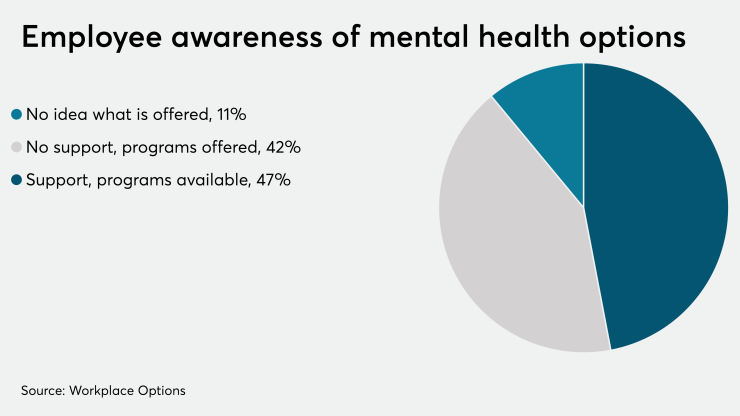In 2019, deaths from drugs, alcohol and suicide in the United States reached
In 2020, there are three key trends we can expect to see related to employers’ efforts to drive transparency, acceptance and support for employees’ mental health and overall well-being.
A commitment to supporting quality care for millennial mental health challenges.
Millennials are more engaged and more open about their mental health struggles than previous generations and they are also more likely to expect mental health benefits from their employers. As recent research shows, this support couldn’t come soon enough: 50% of millennials report having left a job due to mental health reasons and greater declines in both mental and physical health have been reported among the demographic.
We’re already seeing employers seeking to address millennials’ needs by offering beefed-up mental health support. Companies are increasingly considering ways to supplement the mental health care options offered under their health plans, whose directories are often filled with unavailable providers or therapists who are no longer in-network. Employers also want alternatives to low-cost employee assistance programs (EAPs), which are “often very limited in the offerings they provide,” according to
While traditional EAPs typically offer just a handful of counseling sessions, a growing number of prominent employers — including eBay, Roche, and NetApp — are offering mental health benefits that cover a higher number of therapy sessions and wider range of treatment options, including therapy and mental health coaching. This deeper investment in high-quality, comprehensive care gives companies the resources they need to respond to millennial employees’ needs.
A focus on flexible, proven mental health benefit options.
With fierce competition for top talent and more employees shifting to remote work in 2020, workers’ demands for flexibility will increasingly extend to mental health benefits. As a result, companies will design benefit plans that meet the realities of employees’ lives. This means offering mental health care options that are accessible to everyone, regardless of their schedules, where they work or their level of care needs.
To best serve a workforce that expects flexible and accessible benefits, more employers will look to a spectrum of behavioral health care options. That includes offering a range of treatments, from self-care apps for employees experiencing occasional stress to in-person and virtual therapy sessions and prescription medication to treat common, diagnosable conditions such as anxiety or depression. As
A culture of openness, from the top down.
While there’s still plenty of work to be done, more employers today recognize the need to cultivate an accepting culture so that workers feel safe to disclose their mental health issues. Along with new benefits, company leaders are increasingly doing their part to embrace an open dialogue about mental health.
In 2020, more company leaders are likely to take a public stance on mental health, following in the footsteps of executives like
With all of the stressors and seemingly endless demands on our time today, it’s no wonder that nearly
Meanwhile, there’s a growing movement of large companies ready to do their part to destigmatize mental health issues and knock down barriers to care. Building on this momentum in the year ahead will be crucial, and there has never been a better time for employers to invest in their most valuable asset — their people.






